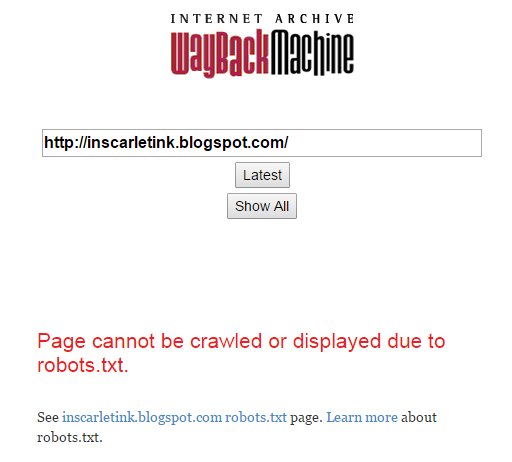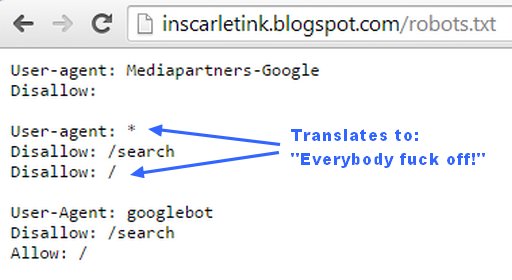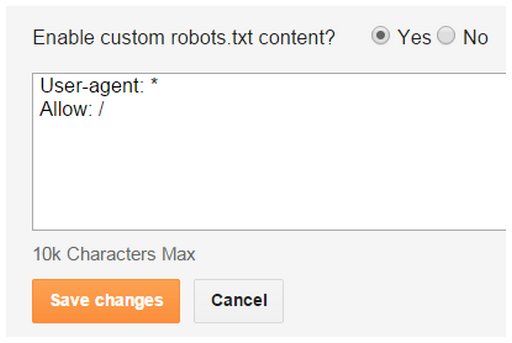Google/Blogger’s “Existing Policy Prohibiting Commercial Porn”
Friday, February 27th, 2015 -- by Bacchus
Now that Google is spinning down the porn raid sirens and walking their shit back from last week’s announced intention to forbid “sexually explicit or graphic nude images or video”, it’s worth paying some careful attention the language used today by Jessica Pelegio, the social product support manager at Google. From her title, this sounds like the woman who is the boss of the people who will be enforcing the policy, so her understanding of the policy is likely to be supremely relevant. And in her announcement, she writes:
“We’ve decided to step up enforcement around our existing policy prohibiting commercial porn.”
The emphasis is mine. “Our existing policy prohibiting commercial porn.” What, what? Does Blogger even have an “existing policy prohibiting commercial porn”? Quick, let’s go look, and snap a screenshot before it changes:
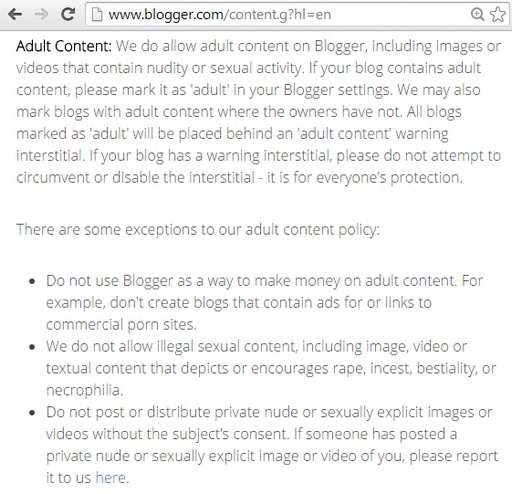
The key sentences for our purposes are:
Do not use Blogger as a way to make money on adult content. For example, don’t create blogs that contain ads for or links to commercial porn sites.
Strictly speaking, this is not a “policy prohibiting commercial porn.” One of the biggest categories of adult blogs on Blogger/Blogspot used to be a (what we would now consider to be Tumblr-style) constant flow of commercial porn, posted without links and purely for the amusement of the poster. You could squint and interpret the URL watermarks on commercial porn photos as “ads for…commercial porn sites”, but Google never did this (that we know of). The existing/current policy simply doesn’t prohibit commercial porn, though it might be said to prohibit porn posted with commercial intent. Does Jessica Pelegio think about the policy with that much nuance? Her phrasing today suggests: not so much.
But while we are parsing words, let’s fire up the Wayback Machine and have a look at how this “existing policy prohibiting commercial porn” has been phrased and characterized by Google since June of 2013 when Google dreamed it up.
Stepping back through time, we discover that between October 23, 2014 and November 6, 2014, they added one clarifying word: “ads or links to commercial porn sites” became “ads for or links to commercial porn sites.” Ads (in general) became ads (for commercial porn sites) so this narrowed the scope of Google’s prohibiting examples. Trivial, but cool. (At the same time as this wording change, Blogger added the current stern language prohibiting attempts to circumvent the interstitial adult warning.)
That takes us back (without any other changes I can discover) to the infamous June 30, 2013, when the current policy was implemented. (Here it is in the Wayback Machine on July 5th, 2013, so you an see for yourself.) Here’s the big announcement from then:
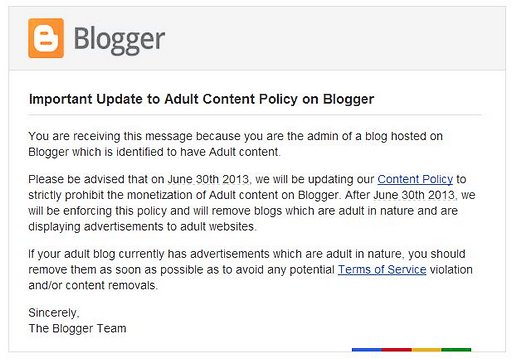
What Pelegio now calls a “policy prohibiting commercial porn” was then described as a new policy prohibiting blogs “which are … displaying advertisements to adult websites” or “currently has advertisements which are adult in nature.” That seems quite a bit narrower than the “policy prohibiting commercial porn” Pelegio now considers it to be.
For completeness, let’s compare the language before June 30, 2013 to the current policy. “Do not use Blogger as a way to make money on adult content” has not changed; that was been the policy since the earliest appearance of the policy page in the Wayback Machine on January 7, 2012. But before June 30, the prohibited example was “For example, don’t create blogs where a significant percentage of the content is ads or links to commercial porn sites.” The big policy change in June 2013 was going zero-tolerance on the ads and links to commercial porn sites — no more insignificant percentages allowed.
So, just to be clear: up until today, Google has always allowed commercial porn on Blogger/Blogspot, as long as that porn was not posted “as a way to make money on adult content.” Noncommercial use of commercial porn was fine, and before June of 2013, so too were de minimis links to commercial porn sites.
If the social product support manager is planning to “step up enforcement around our existing policy prohibiting commercial porn” when there currently is no such policy, for safety you should assume that either the policy will be changing or that the enforcement will hew to the manager’s view of what it means even when that’s not what it actually says. Neither is good news for the future of adult blogs on Blogger/Blogspot.
Sure, let’s all heave a sigh of relief that the March 23rd deadline is no longer looming. But don’t get complacent. If you’ve still got adult content on any Google property, get it out while you still can. Verbum sapienti satis.
Similar Sex Blogging:







